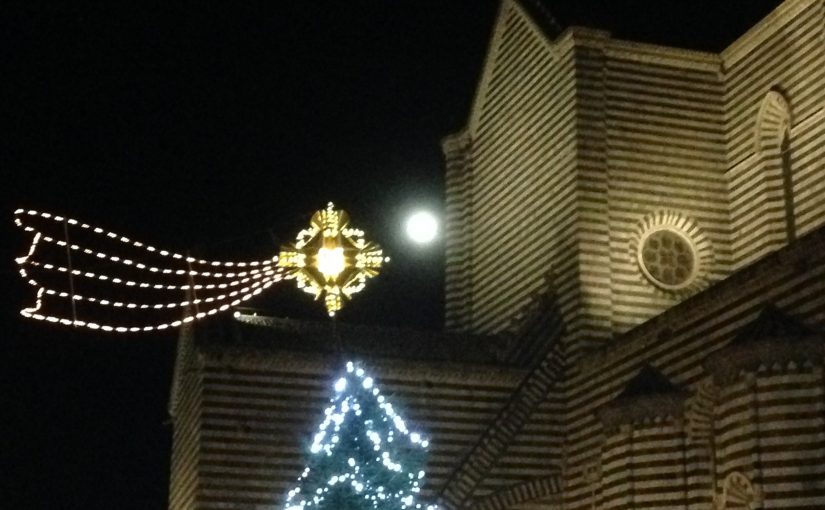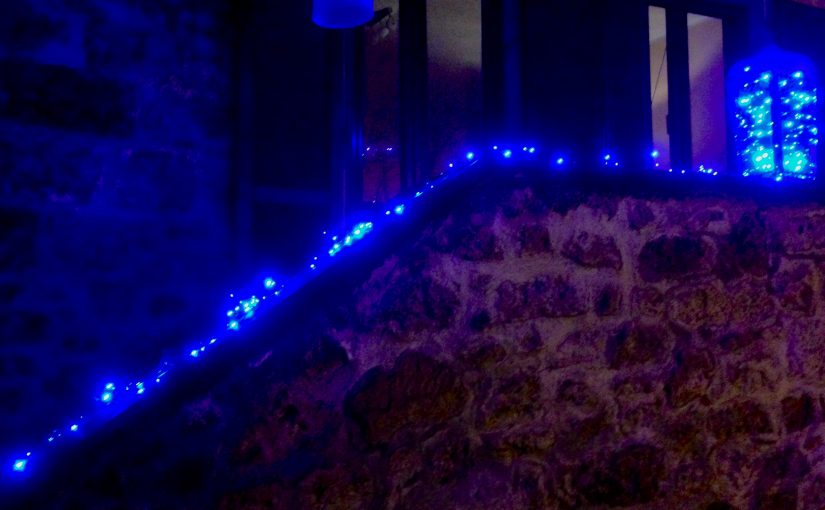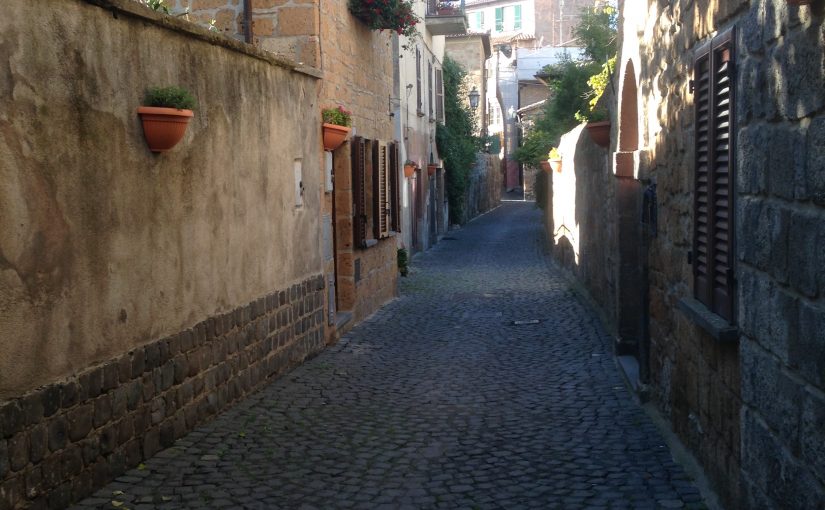When I was a kid, Christmas Eve was always at Grandma Zarko’s. She was born in Croatia in the late 1880’s as Irma Berich and emigrated to California to be Vito Zarko’s bride.
Vito had returned to the Dubrovnik area in search of a wife when he was in his forties, broke his leg, and ended up in the hospital not yet having been successful in his mission. During his recuperation, and being a bit desperate at that point, he began proposing randomly to the nuns who ran the place. Finally, one of them recommended a girl in the laundry room, a lay worker, who never ceased to talk about moving to America. The young woman was sent for, the proposal made and accepted, and six months later she was on a freighter from Liverpool holding a ticket sent her by a Vito Zarko from Sunnyvale, California.
What my grandfather loved most about Irma was her cooking. He died in 1935, but she continued to ply us with fabulous dishes made according to her Dalmatian recipes. Quince candy, spaghetti with prune and garlic sauce, a kind of strudel that has not since found its equal in my experience. On Christmas Eve and Good Friday, we all congregated in her dining room to feast on codfish, white cabbage, white onions, white potatoes, white wine, white bread, and white cheese. It was served on white soap-box china set on white linen. I never knew if this blinding combination was intentional, traditional, or happenstance, but twice a year we risked our vision to celebrate the coming of the light.
Irma died when I was fifteen, and Christmas Eve dinner was taken over by her daughters-in-law. Having no facility for preparing codfish, over the next few years another tradition emerged, one of little things; stuffed mushrooms, open faced melted cheese sandwiches with olives, small cups of creamy fruit salad.
This year in Orvieto, my lovely neighbors Renzo and Patrizia invited me to their celebration. I had dined with them at home before, was aware of their small apartment, their two grown children, Patrizia’s mother, Puni, and the size of their table. So, as I had another invitation to share fondue at a friend’s house in Porano, I sent a message to Renzo allowing them to opt out of their invitation if I would constitute a burden. An hour later, my buzzer sounds – Renzo at the gate.
“No! There’s always room! If you’ve other obligations, we understand, but please come if you can. Let me show you.”
A few weeks ago they hosted a block party in their street level cantina. It’s a narrow room that goes the full depth of the building with a kitchen and bathroom at the very back. He takes me into it now to allay my fears. “We’ll put a table here.” he indicates a span of about twenty meters, “it’ll be tight but we’ll be fine.”
I went for a bottle of prosecco to add to the fig and cinnamon-apple tort I purchased at the elementary school’s holiday presentation last Wednesday, dressed as nice as I’m able, and showed up about 8:30 for a dinner that would commence at nine. I went to knock just as Renzo opened the door. He pulled me in, took my gifts, and started with the introductions, ones that consisted of first names coupled with a dazzling network of relationships. As we reached the far end of the room, more people arrived and we wove our ways back for further introductions. Including the three little kids, there were thirty of us. Daughter Beatrice was introduced. “She speaks English, you might want to sit close to her.”
Didn’t work out. While people sat at table without making any obvious choices, and without instructions from anyone, except for the little kids we ended up with the youngest of us closest to the street and evenly progressed towards maturity as the table arrived at the kitchen. I was between Patrizia’s mother, Puni and Ermette, the husband of the lady across from me and father of Filiberto. Antipasto was already on our plates, and amidst scattered toasting – also without order or instruction – we began to eat.
We would not stop for three hours, the meal consisted of little things, and I felt right at home.
Antipasto was seven, distinct and delicious, finger foods, a tiny cup of salad, and another even smaller cup of a savory whipped confection topped with nuts. The lady across from me raised a warning finger as I reached for what Puni offered me because she couldn’t eat it all. “There will be more. Much, much more.”
Pasta in the form of risotto with peas followed, accompanied by a complete pink sea creature of some variety, that if it was to be eaten, I had to idea where to begin. Then small portions of eggplant parmesan, chickpeas, beans, greens, fruit, the tort I had contributed (“Who fixed this, it’s delicious!” “No one, I bought it.” Laughter all around.) and finally tiramisu and coffee.
Of course, there were various wines and proseccos to choose from during the meal. And lots of talking. In a flip from my young days, it was the youthful half of the table who took pictures and videos of just about everything. The three-year-old boy across from me, Filiberto, delighted in all he discovered, that is, whatever was in reach. Growing gradually more engaged and histrionic as the meal progressed, Filiberto’s performance culminated in a generously sustained squeal and jumping up and down in celebration of a tower of cup holders he built with his uncle.
The faces. Oh, what expressive, open, unselfconscious faces. What sustained affection. What ease.
Amidst all this genial confusion, a couple of internal reflections played out.
Next to Puni on my left was Renzo’s sister, whose name I forget, a ceramicist with a studio in Orvieto. She looks so much like my mother’s brother’s wife, Philomena, that it made me dizzy. Even her hair, the way she arranged it, and the style of combs she used to hold it in place. Her style of clothing, the way she held her head, her gestures. Only her energy distinguishes her from my aunt.
Phil was a little crazy. She stole from my mother, lied to the people at church, and manipulated to such an extent that even her own offspring couldn’t deal with her. At the same time, as one does with family (even family by marriage) I loved her. When she first met my uncle, her prodding, high-energy ways were a breath of fresh air. They lived together for years — though Phil insisted on their perfect rectitude, perhaps correctly. Then they married, two weeks later began to argue, and never stopped for longer than it took to breathe. All of this came flooding back to me whenever I glanced to my left.
To my right was a young man who reminded me so much of a friend of about thirty years ago that I kept wanting to refer to common memories in a language he wouldn’t understand. I never caught his name either, and although not quite as virtual a resemblance as Renzo’s sister has to Phil, his energy made him so hauntingly familiar that I was startled whenever I saw him relating to his friends or taking another photo. We were good friends, me and the guy he reminded me of, then we drifted apart as will happen, so last night was a sort of unanticipated illusion of a reunion.
All through childhood I wanted to attend Christmas midnight mass. My mother never could stay up that late, and my father had famously not been to church since 1934 when they passed the collection plate twice. I don’t believe I ever did get to go. So last night I had high hopes that the family would all troop towards the Duomo shortly before midnight. The hour arrived before I knew it, the table rattled with everyone’s drumming, auguri was shouted, and a group of young people went for the gifts – but no one left the building.
The gift exchange was modest. Puni received a device for cutting potatoes into french fries. She looked at it as if it had been discovered in an Etruscan tomb. I tried to explain, but was intercepted by a girl in her late teens who seemed to consider the device to be the ultimate in modern technology. Perhaps it was her gift. She enthused as Puni continued to grow more perplexed. I could see her trying to find a place for the thing, still in its original box years hence, where it wouldn’t be in the way. The middle-aged man across the table from her took the gadget in hand and mimed how Puni would use it. But all she could think was why would anyone ever want to eat french fries at home, let alone have a special thing to make them with.
Renzo gave me two history books, one in English and Italian about the Etruscans, the other in English about the Duomo. I ordered a book for him too, but it has not yet arrived. The woman across from me who comforted her crying son (not Filiberto) with such patience that for a moment I mistook her for the mother of Christ, gifted me a little white angel, which, once I’ve given it a more careful inspection, I may be able to eat.
A celebration of the arrival of the light cannot help but cause reflections.



